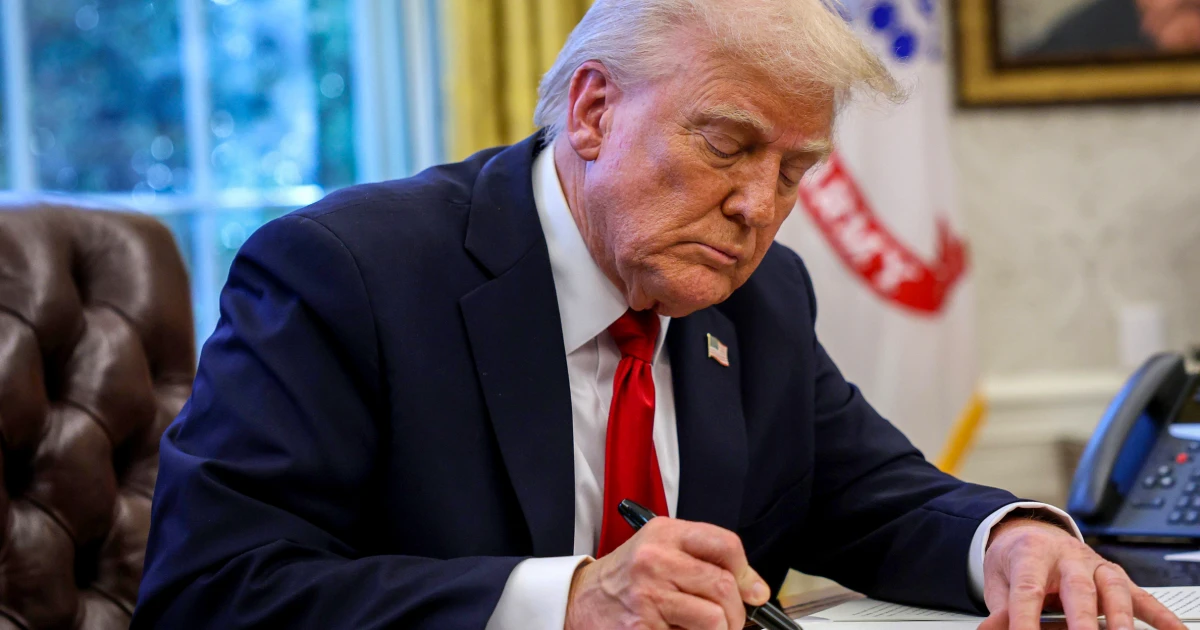As Donald Trump prepared to leave the White House after his 2020 election defeat, the Republican issued some of the most controversial pardons in American history. As the 10th week of his second term nears its end, it’s clear that the president is picking up where he left off.
On the first day of his second term, Trump issued roughly 1,500 pardons and commuted the sentences of 14 Jan. 6 criminals, including violent felons who were in prison for assaulting police officers. A few days later, he kept going, pardoning 23 anti-abortion-rights activists, seemingly unconcerned with their guilt. That was soon followed by a pardon for former Gov. Rob Blagojevich, a man synonymous with corruption in Illinois politics, whom Trump saw as any ally.
Earlier this month, he pardoned a Tennessee Republican who was just two weeks into a 21-month sentence for his role in a campaign finance fraud scheme. This week, as CNBC reported, the list grew a little longer.
President Donald Trump pardoned Nikola Corp. founder Trevor Milton for his October 2022 conviction of federal crimes related to defrauding investors with false claims about the success of the electric and hydrogen-powered truck maker. Milton, 42, was sentenced in December 2023 to four years in prison, but he has been free since then pending an appeal of the former CEO’s criminal conviction on securities and wire fraud charges in U.S. District Court in Manhattan.
The report added that the pardon came just two weeks after federal prosecutors urged U.S. District Court Judge Edgardo Ramos to order Milton to pay restitution of $680 million to Nikola shareholders as well as $15.2 million to Peter Hicks, a victim of his wire fraud.
Milton apparently received a personal phone call from Trump the day before the White House formally confirmed that the president had signed the pardon.
As for why Trump took this step, a reporter asked the president to explain his reasoning, and it didn’t go especially well.
The Republican seemed to know very little about the circumstances surrounding Milton’s crimes, saying that “they” told him that Milton and his family were treated unfairly for political reasons. (Trump also repeatedly referred to himself in third person for reasons that weren’t altogether clear.)
What the president neglected to mention were some relevant details about Milton and his case. For example, as CNBC’s report noted, following his criminal sentencing, the former Nikola CEO “made significant political donations to Trump and his allies. This included $920,000 to the Trump 47 Committee in October of 2024, and $750,000 in September to Robert F. Kennedy Jr.’s MAHA Alliance political action committee.”
Before his conviction, Milton had never before made a campaign contribution, but for some reason, he became quite generous in late 2024.
It also seems worth emphasizing that Milton’s defense attorney was a man named Brad Bondi — and if his last name sounds familiar, it’s because Brad Bondi is Attorney General Pam Bondi’s brother.
Of course, the larger story isn’t just about Milton. On the contrary, it has become apparent to others that the president has created an entirely new legal/political dynamic, without precedent in the American tradition, in which pardons are available to perceived political allies with whom Trump sympathizes.
Sam Bankman-Fried is reportedly angling for a pardon. So is former HealthSouth CEO Richard Scrushy. The New York Times reported a few weeks ago that there’s a White House team in place focusing on “clemency grants that underscore the president’s own grievances,” and well-connected lawyers and lobbyists “have scrambled to take advantage.”
They have collected large fees from clemency seekers who would not be eligible for second chances under apolitical criteria that are intended to guide a Justice Department system for recommending mercy for those who have served their time or demonstrated remorse and a lower likelihood of recidivism. Instead, clemency petitioners are mostly circumventing that system, tailoring their pitches to the president by emphasizing their loyalty to him and echoing his claims of political persecution.
The Times’ report, which has not been independently verified by MSNBC or NBC News, added that among the many eager to take advantage of the new pardon landscape are “a rapper convicted in connection with a Malaysian embezzlement scheme, a reality-television-star couple found guilty of defrauding banks and evading taxes, and two Washington, D.C., police officers convicted after a chase that killed a young man.”
The Times quoted Rachel Barkow, a professor at the New York University School of Law who has studied the use of presidential clemency. She said that while Trump’s first-term pardons were all about “cronyism and partisanship,” the potential for corruption is higher now “because they’re starting early, they have figured out how they want to set it up so that people have a pipeline to get to them.”
Barkow added, “Like any sequel, it’s going to be worse.”
Did I mention that Team Trump recently ousted the Justice Department’s pardon attorney, as part of a broader political purge of federal law enforcement? Because that happened, too.
The next time you hear presidential chest-thumping about “law and order” and “tough on crime,” keep this in mind.
This post updates our related earlier coverage.
